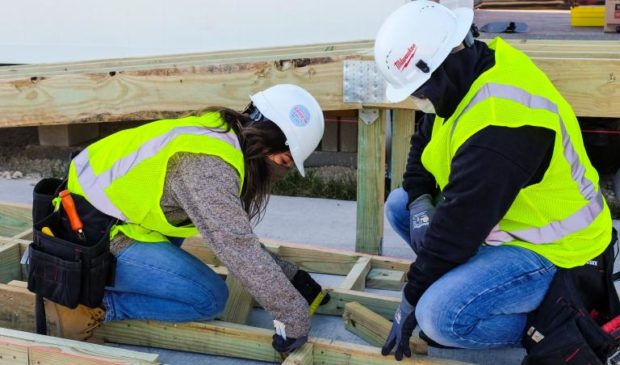Conservation Corps sees success, and possible expansion, in city memo
Monday, April 3, 2023 by
Chad Swiatecki An evaluation of the city’s Civilian Conservation Corps program shows that nearly 200 people have been placed in city jobs in areas that had been historically difficult to fill.
A memo released last week by Kimberly McNeeley, director of the Parks and Recreation Department, gave a comprehensive progress report on the CCC, which was created as part of the city’s Innovation Office in 2020 and then transferred to PARD’s oversight last year. The memo said that 197 positions have been filled as of late March, with those jobs coming from the city’s internal needs in areas such as land management, stormwater infrastructure and environmental education. Externally, the program has directed candidates toward jobs with nonprofit groups such as American YouthWorks, Go Austin/Vamos Austin, the Other Ones Foundation, Gulf Coast Carpenters and Millwrights Training Trust Fund, Creative Action and Raasin in the Sun.
The CCC was originally conceived as one of the programs created as a Covid-19 relief program, using federal money allocated as part of the Coronavirus Aid, Relief and Economic Security (CARES) Act in 2020. Its funding was eventually moved to be part of the city’s General Fund expenses, and with its focus widened to fill the “green” jobs needed by the city’s 2021 Climate Equity Plan that was passed in 2021.
City Council Member Alison Alter has made the CCC one of her priorities since it was first proposed, and has pushed for the revival of the New Deal-era effort that helped address conservation needs across the country beginning in the 1930s. Alter told the Austin Monitor that she’s encouraged by the program’s evolution away from strictly pandemic-related needs, especially with its ability to fill seasonal employment opportunities that the city has struggled to fill.
“I’m really excited about how we have transitioned the program to be about equity and creating pathways to green jobs in ways also that really meet the needs of the city, whether it’s with respect to workforce development and recruitment or with respect to the actual conservation work or cultural work that’s getting done through these programs,” she said. “From the beginning, we thought that this might be an opportunity to address recruitment issues in the city, as well as to solve some contracting challenges that environmental and conservation work poses. Because it tends to be seasonal within our city procurement process.”
Related to program administration, the city has to date approved two positions, with one coordinator role already filled and a manager position scheduled to be filled this month.
The memo references three external reports on the CCC – from the nonprofits MEASURE and Build With Humanity and from the University of Texas School of Architecture’s Community and Regional Planning Program – that are being used to build a five-year road map for the program. Those reports paint a picture of a robust, ongoing need for green jobs in the Austin area well into the future, with those jobs offering new opportunities for the city’s historically marginalized communities.
Among the next steps for putting together the CCC’s five-year plan: increasing job incentives and support to improve hiring, building more relationships with community organizations and improving the diversity of program leadership related to the populations served.
Alter said components of the CCC such as an accelerator that promotes projects from groups such as Fruitful Commons are another cause for optimism.
“(The reports) highlighted several things that we can do to advance the project that I hope that we will move forward with. Our Austin Climate Equity Plan also focuses on green jobs, and one of the ways that you make a transition for the environment in an equitable way is with those green jobs. The Civilian Conservation Corps is really the main mechanism that we have right now for achieving that.”
This story has been changed since publication. Though the memo stated the CCC was originally created as part of the Economic Development Department, this is incorrect.
The Austin Monitor’s work is made possible by donations from the community. Though our reporting covers donors from time to time, we are careful to keep business and editorial efforts separate while maintaining transparency. A complete list of donors is available here, and our code of ethics is explained here.
You're a community leader
And we’re honored you look to us for serious, in-depth news. You know a strong community needs local and dedicated watchdog reporting. We’re here for you and that won’t change. Now will you take the powerful next step and support our nonprofit news organization?









